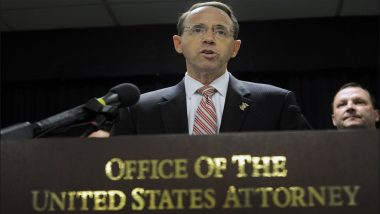A day after a report in the New York Times named U.S. Deputy Attorney General Rod Rosenstein as the man who wanted to invoke the 25th Amendment against current U.S. President Donald Trump which could lead to his removal, the justice department official has offered his resignation but denied the report.
Rosenstein is also overseeing the Russia investigation which is investigation meddling in the 2016 Presidential elections and his exit holds consequences for the probe headed by Special Counsel Mueller.
Rosenstein assumed supervision of the investigation after his boss, Attorney General Jeff Sessions, recused himself because of his own contacts with Russia's ambassador to Washington while serving as a Trump campaign adviser became public.
The U.S. president had previously floated the idea firing Rosenstein in April after FBI raids of the office and home of the president's longtime personal attorney, Michael Cohen, who has since pleaded guilty to several felonies and taken part in interviews with Mueller's team.
Rosenstein has met U.S. Chief of Staff John Kelly and emphatically denied that he ever sought to record Trump or weighed invoking the 25th Amendment, at first calling the story "inaccurate and factually incorrect." But Kelly relayed to Rosenstein that a firmer denial was required, resulting in a second statement from the deputy attorney general, according to CNN.
Rosenstein held a phone meeting with the U.S. President today who is in New York for the United Nations General Assembly. Post the phone call, White House press secretary Sarah Sanders released a statement that delayed a decision on his fate until Thursday, so that Rosenstein and Trump can meet in person.
"I'm meeting with Rod Rosenstein on Thursday when I get back from all of these meetings," Trump said later in the day. "And we'll be meeting at the White House, and we'll be determining what's going on. We want to have transparency, we want to have openness and I look forward to meeting with Rod at that time."
Rosenstein’s role is crucial as his removal would come just months before the November mid-term elections and the Republican Party could be accused of trying to obstruct the Russia investigation. Utah GOP Senator Orrin Hatch told reporters it was up to Trump whether to fire Rosenstein, but said if he did make such a move, "it would cause a furor that I don't think we need right now."
Meanwhile, one of Trump's personal attorneys also weighed in. Jay Sekulow said on his radio show on Monday that if Rosenstein left and a new person was put in place overseeing the Mueller probe, there should be a review and "basically a time out on this inquiry."
Rosenstein was appointed by Trump as deputy attorney general but has since expressed extreme frustration with him, especially his decision to hire Mueller last year. Trump has repeatedly branded the investigation a "witch hunt."
(The above story first appeared on LatestLY on Sep 25, 2018 09:07 AM IST. For more news and updates on politics, world, sports, entertainment and lifestyle, log on to our website latestly.com).













 Quickly
Quickly


